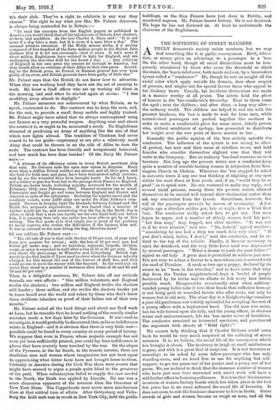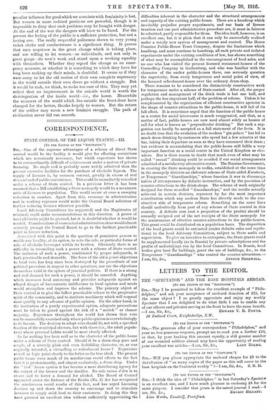THE SOFTENING OF STREET MANNERS.
ATRULY democratic society exists nowhere, but we may find something like it in public conveyances. Birth, educa- tion, or money gives no advantage to a passenger in a 'bus.
On the other hand, though all social distinctions must be tem- porarily abandoned by those who cross the threshold or climb tho stairs, the 'bus is ruled over, both inside and out, by a benevolent tyrant called a " conductor." He, though he sets at naught all the social rules which apply outside his domain, does show respect of persons, and singles out for special favour those who appeal to
his Cockney heart. Usually, his invidious distinctions are made in a manner worthy of all praise. The infirm hold the place
of honour in the 'bus-conductor's hierarchy. Next to them come the aged ; next the children ; and after them—a long way after— the ordinary world. The children are helped in and out with the
greatest kindness, the 'bus is made to wait for lame men, -while normal-sized passengers are packed together like sardines in order to make a comfortable place for some stout, elderly person who, without semblance of apology, has proceeded to distribute her weight over the two pairs of knees nearest to her.
Generally the public opinion of the 'bus entirely upholds the conductor. The influence of the tyrant is too strong to allow of protest, but now and then cases of rebellion occur, and bold females who consider themselves slighted vow that they will write to the Company. But an ordinary 'bus-load contains no such heroines. Not long ago the present writer saw a conductor keep quite a number of sensible-looking women in subjection from Ken- sington Church to Chelsea. Whenever the 'bus stopped he asked in sarcastic tones if any one was thinking of alighting at any spot within the next three or four yards, and, if so, "would they be so good" as to speak now. No one ventured to make any reply, and several timid persons, among them the present writer, allowed themselves to be carried well beyond their destination rather than ask any concession from the tyrant. Sometimes, however, the will of the passengers prevails by reason of unanimity. A few nights ago a drunken soldier got, late at night, into a West End 'bus. The conductor civilly asked him to get out. The man began to argue, and a number of elderly women took his part. " Let him stop," they begged, one after another. " It was not as if he were abusive," said one. " No, indeed," agreed another ; " considering he has had a drop too much he's very nice." " If you don't mind, ladies, I don't," said the conductor, and he re- tired to the top of the vehicle. Finally, it became necessary to eject the drunkard, and the very little force used was deprecated by several passengers. " What a shame to push the poor follow " sighed an old lady A great deal is permitted to soldiers just now. Itis not easy to refuse a favour to a man whose coat is covered with the mud of Flanders. A week or two ago a puppy, declared by its owner to be " born in the trenches," and to have come that very day from the Verdun neighbourhood, kept a 'busful of people fascinated by its tricks and its efforts to lick every face within possible reach. Disagreeables occasionally arise when military- minded young ladies take it into their heads that sufficient homage is not being paid to wounded heroes who offer seats, not only to women but to old men. The other day in a Knightsbridge omnibus a poor old gentleman was volubly upbraided for accepting the seat of a young officer with a beplastered head. The old man was mute, but his wife turned upon the lady, and the young officer, in obvious terror and embarrassment, left the 'bus under cover of hostilities. The conductor remained an interested spectator, and punctuated the argument with shouts of " Hold tight I "
We cannot help thinking that if Charles Dickens could come back ho would be very much surprised at the softening of street manners. It is, we believe, the social life of the conveyance which has brought it about. The tendency to laugh at small misfortunes is gone, and with it a great deal of suspicion. It is not uncommon nowadays to be asked by some fellow-passenger who has only standing-room, and no hand free to use for anything but self- support, to get her purse out of her pocket and a penny out of her purse. We are inclined to think that the immense number of women who have just now been entrusted with men's work will have a still further effect in fostering politeness. It is true that the immense incursion of women factory hands which has taken place in the last few years has in no sense softened the social life of factories. It does not seem to suit the feminine character to live in herds. Great crowds of girls and women become as rough as men, and all the
peculiar influence for good which we associate with femininity is lost, But women in more isolated positions are powerful, though it is impossible to deny that such positions may be fraught with danger. At the end of the war the dangers will have to be faced. For the present the feeling of the public is a sufficient protection, but not a lasting one. The really respectful politeness shown to very young ticket clerks and conductresses is a significant thing. It proves that men acquiesce in the great change which is taking place, and are willing to let women—as individuals, and not only in great gangs—do men's work and stand upon a working equality with themselves. Whether they regard the change as an emer- gency measure, or whether it is something to which they have for long been making up their minds, is doubtful. It seems as if they were sorry to let the old notion of their own complete supremacy in the world outside their own doors go without a struggle. But it would be rash, we think, to make too sure of this. They may yet reflect that no improvement in the outside world is worth the disintegration of the inside world—i.e., the home. Meanwhile the manners of the world which lies outside the front-door have changed for the better, thanks largely to women. But the return of the soldier may mean a new feminist struggle. The path of civilization never did run smooth.































 Previous page
Previous page